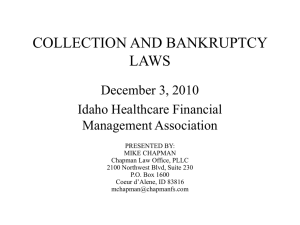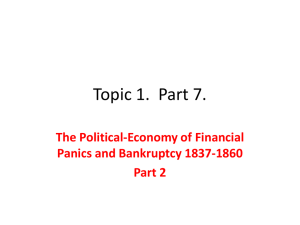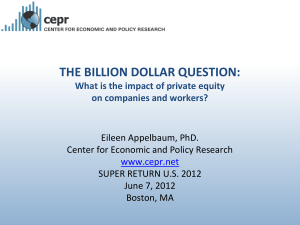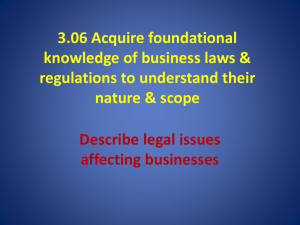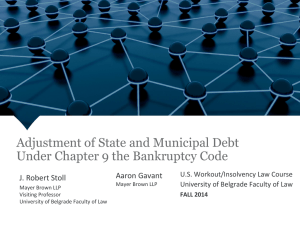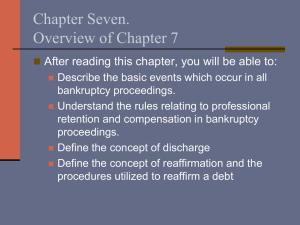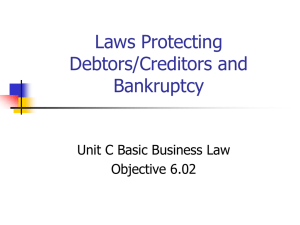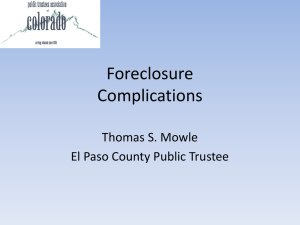CBF Title 18 Panel Presentation - Klein DeNatale Goldner Cooper
advertisement
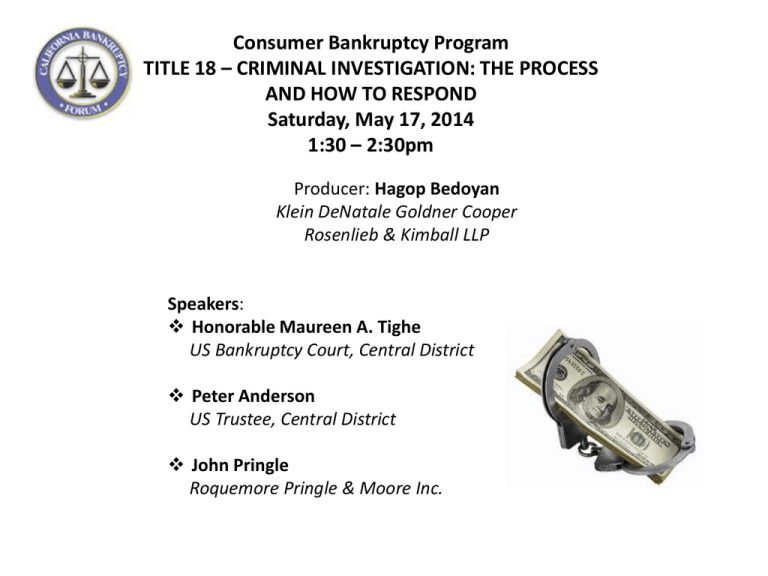
Consumer Bankruptcy Program TITLE 18 – CRIMINAL INVESTIGATION: THE PROCESS AND HOW TO RESPOND Saturday, May 17, 2014 1:30 – 2:30pm Producer: Hagop Bedoyan Klein DeNatale Goldner Cooper Rosenlieb & Kimball LLP Speakers: Honorable Maureen A. Tighe US Bankruptcy Court, Central District Peter Anderson US Trustee, Central District John Pringle Roquemore Pringle & Moore Inc. Who files? Real Housewives Do! Baseball Players Do! Even Baseball Teams NFL Players Do Churches Too! And Celebrities Why file? Generally, bankruptcy law allows debtors, who are unable or partially unable to pay outstanding debts, to rid themselves of these debts and obtain a fresh start. As stated by the United States Supreme Court, bankruptcy gives "the honest but unfortunate debtor ... a new opportunity in life and a clear field for the future, unhampered by the pressure and discouragement of preexisting debt." (Local Loan Co. v. Hunt, 292 U.S. 234, 244 (1934)). In exchange, the Debtor must tell the truth, the whole truth and nothing but the truth However, some people: Don’t tell the truth or they use the bankruptcy filing as part of a fraud scheme 18 U.S.C. § 3057 – Bankruptcy Investigations (a) Any judge, receiver, or trustee having reasonable grounds for believing that any violation under chapter 9 of this title or other laws of the United States relating to insolvent debtors, receiverships or reorganization plans has been committed, or that an investigation should be had in connection therewith, shall report to the appropriate United States attorney all the facts and circumstances of the case, the names of the witnesses and the offense or offenses believed to have been committed. Where one of such officers has made such report, the others need not do so. 28 U.S.C. § 586 - DUTIES; SUPERVISION BY ATTORNEY GENERAL Section 586 of title 28 imposes a similar duty on the United States Trustee to refer any matter that may constitute a violation of criminal law to the United States Attorney and, upon request, to assist the United States Attorney in prosecuting the matter. This statutory obligation does not provide for the referral of only those matters which will be prosecuted or for which there is proof beyond a reasonable doubt. Nor is it subject to any thresholds or guidelines established by the United States Attorneys’ offices. Fifth Amendment • A DEBTOR CAN EXERCISE HIS/HER FIFTH AMENDMENT RIGHT AGAINST SELF-INCRIMINATION; • WHETHER THE PRIVILEGE EXTENDS TO THE PRODUCTION OF DOCUMENTS AND PREPARATION OF SCHEDULES IS A COMPLICATED ISSUE; Continued… • THE PRIVILEGE DOES NOT APPLY TO CORPORATE DEBTORS; • THE PRIVILEGE IS WAIVED BY FAILING TO TIMELY INVOKE IT AND BY DISCLOSURE OF INCRIMINATING EVIDENCE; • IF THE FIFTH AMENDMENT IS PROPERLY INVOKED, THERE IS NO DENIAL OF DISCHARGE SIMPLY FOR FAILURE TO TESTIFY; • IF GRANTED IMMUNITY, THE DEBTOR CAN BE COMPELLED TO TESTIFY; and, • AN ATTORNEY CAN BE CRIMINALLY LIABLE FOR KNOWINGLY SOLICITING FALSE TESTIMONY. Bankruptcy Fraud Criminal Statutes Bankruptcy Fraud Statutes • 18 USC §152 – giving, receiving, or concealing assets; making false statements, withholding, destroying, concealing or altering records; filing false claims; bribery • §153 – Embezzlement against the estate • §154 – Adverse interest & conduct of officers • §155 – Improper fee agreement • §156 – Knowing disregard of bankruptcy laws • §157 – Scheme to defraud • §1519 – Destruction of documents 18 U.S.C. §152 • Primary bankruptcy fraud statute • Applies to conduct by all persons involved in the bankruptcy process: debtors, trustees, lawyers, property custodians • 5 year maximum penalty 18 U.S.C. §152 Section 152 “… attempts to cover all the possible methods by which a bankrupt or any other person may attempt to defeat the Bankruptcy Act through an effort to keep assets from being equitably distributed among creditors.” Stegman v. United States, 425 F.2d 984, 986 (9th Cir. 1970) quoting 2 Collier on Bankruptcy 1151 (14th ed. 1968). 18 U.S.C. §152 Prohibits criminal conduct related in any way to the bankruptcy proceeding – – – – – – §152(1) §152(2) §152(3) §152(6) §152(7) §152(8) - – §152(9) - concealment of assets false oath false declaration or statement bribery pre-petition concealment/transfer destroying, concealing or falsifying documents withholding documents 18 U.S.C. §152(1) Concealment of Assets Elements • • • • Bankruptcy proceeding existed; Property belonged to the bankruptcy estate; The defendant concealed the property; and The defendant did so knowingly and fraudulently. Lenny Dykstra charged with (in part) §152(1) False Oaths 18 U.S.C. §152(2) Elements • • • • • Bankruptcy proceeding existed; A statement was made under oath; The statement was material; The statement was false; and The defendant knew it was false when made and it was made with intent to defraud. What is Material? The false statement, false oath or scheme must have the capacity or potential to influence the actions of a creditor, a trustee, or the bankruptcy court. False Statements Under Penalty of Perjury 18 U.S.C. §152(3) • Bankruptcy proceeding existed; • Debtor made a declaration or statement under penalty of perjury; • The statement was material; • The statement was false; and • The defendant knew the statement was false when made and it was made with intent to defraud. Milton Vandevort guilty (in part) of §152(2) and (3) October 18, 2011 “A Bel-Air man was sentenced this afternoon to 70 months in federal prison for concealing assets in a bankruptcy proceeding and threatening a private investigator with a golf club. Milton Lee Vandevort, 50, was sentenced by United States District Judge Phillip S. Gutierrez. In addition to the 70-month sentence, Judge Gutierrez ordered Vandevort to pay $12,500 in fines.” Vandevort has been in custody since July 14, 2010, when, after a two-week trial, a federal jury convicted him of seven counts: two counts of concealing assets in a bankruptcy case, making a false oath in a bankruptcy case, making a false declaration in a bankruptcy case, assaulting a process server, and two counts of money laundering.” Stocker Street and Related DBAs 18 U.S.C. 152(3) Michael Ybarra, Jeremy Lloyd, and Steven Benjamin were indicted in 2012 for running a foreclosure rescue service that used DBAs and fractional interest real property transfers, and bankruptcy to forestall foreclosure. Lloyd was sentenced to five years probation, and Benjamin to three years. Ybarra has entered into a plea agreement but has not been sentenced. Scheme to Defraud 18 U.S.C. § 157 • Modeled after the mail (§1341) and wire (§1343) fraud statutes • Person knowingly and intentionally devised or participated in a scheme to defraud • Examples are current foreclosure rescue schemes that involve bankruptcy filings §157 continued • To execute the scheme, the person: – Files a petition (voluntary or involuntary) – Files a document in a bankruptcy – Made a false or fraudulent claim, representation or promise • concerning a bankruptcy Cohen, Bowman and Phillips Fractional Interests and Use of DBAs 18 U.S.C. § 157(1) In 2010, Darwin Bowman, Irving Cohen and Robin Phillips were accused of executing a foreclosure rescue scheme that encompassed filing bankruptcies that delayed foreclosure on nearly 1500 properties and affected more than $200 million in mortgages. Ultimately, Phillips and Cohen were both sentenced to one year and a day in prison, and 75- year-old Bowman was sentenced to eight months in a halfway house and additional home confinement. Former Federal Fugitive Sentenced in California for Nationwide Foreclosure Scam Collected More Than $1.2 Million from More Than 800 Distressed Homeowners 18 U.S.C. § 157(3) August 5, 2013 - Glen Alan Ward, 48, a former Los Angeles resident who fled to Canada and was a federal fugitive for 12 years, was sentenced today to serve 132 months in prison for aggravated identity theft and bankruptcy fraud in connection with his leading role in a nearly 15-year foreclosure-rescue scam that fraudulently postponed foreclosure sales for more than 800 distressed homeowners. Ward caused fractional interests in real property to be transferred to unsuspecting debtors through the use of a PACER account. 18 U.S.C. §1519 Sarbanes-Oxley Act of 2002 “Whoever knowingly alters, destroys, mutilates, conceals, covers up, falsifies, or makes a false entry in any record, document, or tangible object with the intent to impede, obstruct, or influence the investigation of any matter…filed under [the Bankruptcy Code], or in relation to or contemplation of any such matter or case, shall be fined under this title, imprisoned not more than 20 years, or both.” Foreclosure Fraud Foreclosure Fraud According to FBI and U.S. Trustee Program, the United States bankruptcy system is being exploited to perpetrate foreclosure rescue schemes: • Advance Fee Foreclosure Rescue • Fractional Interest Transfers with Fictitious DBAs or Corporations • Sale-Leaseback-Repurchase Scheme Advance Fee Foreclosure Rescue Scheme • Falsely tell victims that their mortgages and delinquent loans will be renegotiated; • Require an upfront fee and may require a monthly fee to participate in a “loan modification program”; • Use the bankruptcy system to delay foreclosures by filing fraudulent, often serial bankruptcy petitions for as long as possible. Fractional Interest Transfer Scheme • Homeowners are convinced to deed partial interests in their properties to fictitious companies; • Perpetrators file a fraudulent bankruptcy case in the name of the fictitious company thereby stopping the foreclosure process and preventing any further collection efforts; • After the court grants relief from the automatic stay, another interest in the property is transferred and the process starts again. Sale–Leaseback-Repurchase Scheme • Perpetrators persuade delinquent homeowners to deed their homes over; • Promise to assume the mortgage payment, find an investor to purchase the victim’s home and rent it back for less than the mortgage payment; • Promise to payoff the full value of the victim’s delinquent payments; and reestablish the homeowner’s credit with a lease-to-buy option; • Instead, the perpetrators file a fraudulent bankruptcy case. What the OUST does… • Pull bankruptcy documents and 341(a) meeting recordings; • Review and analyze them; • Train agents and other law enforcement personnel; • Provide agent support by preparing documents; and • Assist with bankruptcy related witnesses. How do you know of Criminal Investigation? • • • • You usually don’t Might hear about a law enforcement inquiry Might hear of a grand jury subpoena Client might be interviewed (if not represented) • Assume there may be one if there is any basis at all to believe criminal penalties could attach USAO Process After Referral • No mandated time frame (Can sit for years) • Referral is reviewed and either: – Declined – Fed into preexisting investigation if it is related – Referred to an investigating agency • Usually FBI • Might be IRS, Postal, HUD/VA IG – Grand Jury Investigation opened If USAO Pursues Case • Evidence developed through – Anything available from civil proceedings – Grand Jury interviews and subpoenas – Law enforcement interviews (not all witnesses called to grand jury) • Presentation made to internal USAO committee of all evidence and potential charges After Internal USAO Review • If urgent, Complaint sought before indictment • If authorized, presentation of charges made to grand jury • Chief of Criminal Division authorizes • Sometimes Approval required from DOJ • Sometimes Pre-indictment contact with subject for discussions • Arrest or Summons Issued post-indictment

